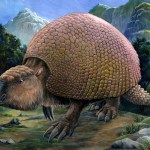Mega-fauna
Ok, part of this is just that I really like the word "Glyptodon" and am trying to find more uses for it ;-). But there is a point here, I'm pretty sure.
A while back I was teaching a class, and the gentleman teaching before me, an Algonquin Native Descendent, who was talking about the history of the ways that waterways in the Northern US had impacted patterns of settlement and development, became quite passionate at the sight of Eric's t-shirt, which had an mastodon on it. The gentleman launched into a staunch defense of his ancestors, who for a long time were typically considered to be…
Modern civilization has extremely deleterious consequences in regards to species richness, primarily through destruction of habitat. Because of these negative aspects of modernity hunter-gatherers have been idealized as a model of humanity at equilibrium with their ecology. 1491: New Revelations of the Americas Before Columbus lays out the revisionist, and to some extent now mainstream, argument that the American wilderness which European settlers encountered was actually an instance of "re-wilding" in the wake of native demographic collapse due to disease. But setting this case aside, what…
Brian Switek, The extended twilight of the mammoths:
So, if the team's analysis is correct, both mammoths and horses lived in the interior of Alaska between about 11,000 and 7,000 years ago. This is significantly more recent than the youngest fossil remains of horses and mammoths, dated between 15,000 and 13,000 years ago. There are at least two factors that might contribute to this disparity. The first is that fossils from this more recent time were preserved but have not yet been found. More likely, though, is that the populations of both mammoths and horses had dwindled to the point where…
